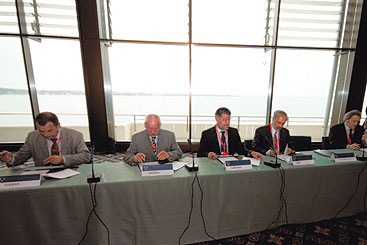
Setting sail:
Slovenia, the Danube and
the EU Presidency
As the EU Council Presidency passes to France, the achievements of Slovenia’s EU Presidency will continue to highlight the commitment to the fight against climate change and the loss of biodiversity.

The 9th Ordinary Meeting of the Trilateral Commission for the Adriatic Sea was held in Portororž in June to prepare a strategy for coastal and marine zone management.
Slovenia held the eU Council Presidency from January to June 2008 and achieved a range of objectives in the fields of adminstration, cultural dialogue and labour laws. one of the main priorities of the Slovenian Presidency is the fight against climate changes and creating measures against the loss of biodiversity. Intensive dialogue at global, regional, national and local level is required to reach consensus on the implementation of programmes with concrete measures and this was achieved through the presidency.
A climate-energy package was created where the key issue is planning and carrying out effective adaptation measures. Pragmatic association of the principles of the EU Water Framework Directive (WFD), the Flood Directive and the new Marine Directive is of key importance for the preparation of efficient river basin and coastal zone management plans.
Managing floods and marine zones. Slovenia and Austria organised an EU workshop to implement the Flood Directive as a concrete example of a divided city connected by a common river. This is a pilot project and the approach will be transferred to other rivers (e.g. Drava, Sava, Soča).
To implement the EU Marine Directive, Slovenia organised the first meeting of all coastal Adriatic countries in Portororž with the purpose of carrying out Article 5 of the Directive and preparing a sub-regional – Adriatic strategy for coastal and marine zone management.
Fighting for biodiversity. At the Ninth Meeting of the Conference of the Parties meeting in Bonn the EU achieved implementation of all its objectives to stop the loss of biodiversity. At a meeting of environment ministers at Brdo, Slovenia, the discussion was on the necessity to consider forest and biodiversity in planning measures.
Slovenia and the WWF presented “Dinaric Arc” on the importance of the Dinarides ecoregion prompting the associated Ministers of the Environment to sign a joint statement to strengthen cooperation for sustainable management there. Slovenia plans to host a workshop in 2008 on reaching these objectives.
Committed to cooperation. All the above activities are closely connected to the regional approach, which is carried out by ICPDR and the Secretariat in the Danube River Basin. Because of its active role, we prepared an important sub-regional cooperation in the Sava River Basin. The International Sava River Basin Commission and ICPDR signed a cooperation agreement in Belgrade.
New forms of cooperation are required to carry out the adaptation measures. The EWP brings numerous new possibilities and opportunities with direct participation of the economy, science, public and administrative institutions. The support of the EU Parliaments and Commission is a reason for optimism.
Therefore in light of the scope of the presidency and the relative brevity of the period of administration, significant achievements were made which should have an impact on the management of the Danube for years to come.
Disclaimer
The information contained in the ICPDR website is intended to enhance public access to information about the ICPDR and the Danube River. The information is correct to the best of the knowledge of the ICPDR Secretariat. If errors are brought to our attention we will try to correct them.
The ICPDR, expert group members, nor other parties involved in preparation of information contained on this website cannot, however, be held responsible for the correctness and validity of the data and information provided, nor accept responsibility or liability for damages or losses arising directly or indirectly from the use of the information conveyed therein.
Only those documents clearly marked ICPDR documents reflect the position of the ICPDR.
Any links to other websites are provided for your convenience only. The ICPDR does not accept any responsibility for the accuracy, availability, or appropriateness to the user's purposes, of any information or services on any other website.
When using the information and material provided on this website, credit should be given to the ICPDR.
